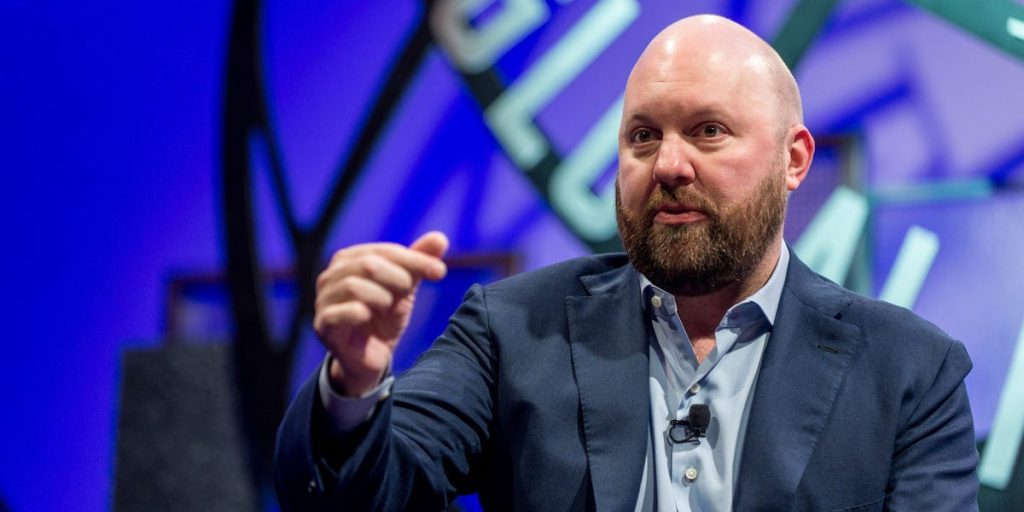- VC Marc Andreessen wrote a lengthy missive this week, titled “The Techno-Optimist Manifesto.”
- The billionaire investor denounced efforts to regulate technology and AI.
- The tech industry was quick to react to Andreessen’s comments on social media.
It wouldn’t be a Marc Andreessen essay if the internet didn’t lose its mind over it.
That’s what happened Monday when the billionaire venture capitalist dropped a lengthy manifesto that decries efforts to regulate technology and the full-blown moral panic around artificial intelligence. Rather, technology, he wrote, can solve for “any material problem” under the sun and herald a new era of “abundance for everyone.”
“Typical boneheaded straw man setup that EVERYONE but the fine minds of tech elite hate the future. Most of us are both excited and wary — given the cost so far — about tech and that is how adults behave,” tech journalist Kara Swisher said on X, speaking for the everyman.
Andreessen’s screed clocks in at 5,200 words, but it’s one section in particular that has other investors, artificial-intelligence alarmists, and journalists up in arms.
In a section titled “enemies,” Andreessen warned of “zombie ideas” stemming from the past that have turned humanity against the very technologies he invests in.
These ideas go by pseudonyms, he wrote, such as “sustainability,” “ESG,” “social responsibility,” “trust and safety,” “tech ethics,” and “risk management,” touching on one of the most contentious debates in tech over the industry’s obligations to society.
The bit went viral after investigative journalist Ben Collins tweeted a quote from the essay, which published on Substack and A16z’s website. Andreessen’s missive went out the same day that the Securities and Exchange Commission released an annual report on its priorities when inspecting firms for compliance with agency rules. It noticeably removed ESG, which stands for environmental, social, and governance matters, as a focus for examinations in 2024, three years after the standards first appeared.
The backlash to Andreessen’s essay was swift. German tech ethicist Dorothea Baur said on X she couldn’t decide whether she should “laugh or cry.” Cameron Moll, a former head of design at Facebook, tweeted as a father he’s concerned that technology without regulation “is a recipe for regret, remorse, and ruin.” Gary Marcus, one of the leading voices of AI skeptics, chastised the investor for dismissing anyone who disagrees with him as the enemy.
“The very idea that the world might focus on sustainable development goals for the sake of the less fortunate puts him in absolute agony,” Marcus wrote of Andreessen.
Others still praised the investor for saying aloud what’s discussed behind closed doors.
“Marc Andreessen is brave enough to say what most of us can’t,” Aravind Srinivas, the cofounder and chief executive of Perplexity AI, a search engine startup backed by A16z, tweeted. “He is pushing for a technocratic world. And raising and allocating capital to make it happen.”
A spokesperson for A16z declined to comment on the criticism swirling around Andreessen’s post.
‘I present to you, moral hazard’
Andreessen’s mug is etched on the Mount Rushmore of Silicon Valley. He runs one of the biggest venture capital firms by assets and perceived importance. Its successful early bets on crypto inspired a generation of venture investors to pump money into the industry, that is, before the bursting of the crypto bubble sent them packing.
In his tweet, the journalist Collins noted that the firm Andreessen Horowitz has dialed back the hoopla around crypto investing and taken a stronger interest in American military and defense contractor technology this year.
The essay laid bare an awkward truth: The venture capital ecosystem seeds companies using technology to build a better world, but its primary goal is to create profits for the public pensions, university endowments, hospitals, and wealthy families that invest in its funds.
Perhaps the most scathing rebuke came from Del Johnson, a former principal at Backstage Capital and now angel investor and limited partner in venture funds. In a tweet, he pointed to the March bank run at Silicon Valley Bank, which Johnson has previously blamed on the VCs who urged founders to withdraw their deposits, as evidence of the need for regulators to wrest control from investors.
“Venture capitalists are calling risk management ‘the enemy’ just over half a year after the industry was screaming for the government to rescue their failing bank,” Johnson wrote. “Ladies and gentlemen, I present to you, moral hazard.”
Read the full article here





